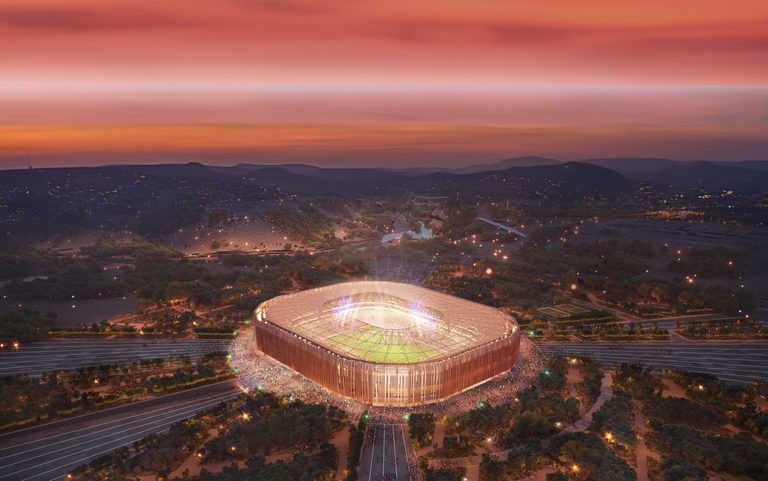Handout via Reuters Saudi Arabia’s sports minister, Prince Abdulaziz bin Turki Al Faisal, celebrates as Fifa confirms Saudi Arabia as the 2034 World Cup host 15 stadiums across five cities First tournament with 48 teams Likely to be held in winter Fifa, the world football governing body, has officially named Saudi Arabia as the host […]


Handout via Reuters
- 15 stadiums across five cities
- First tournament with 48 teams
- Likely to be held in winter
Fifa, the world football governing body, has officially named Saudi Arabia as the host nation for the 2034 World Cup.
The kingdom submitted its bid to host the event in July under the slogan “Growing. Together” after Fifa invited bids from countries in Asia and Oceania last year. The only country in contention, Australia, did not apply on the final day of the bids.
The Gulf state has promised to deliver “a tournament of a lifetime” after being selected as World Cup 2034, the state-run Saudi Press Agency (SPA) reported.
“The kingdom is on a remarkable journey of transformation under Vision 2030 and today is another huge step forward that reflects and celebrates our progress while looking ahead to an even brighter future,” said Prince Abdulaziz bin Turki bin Faisal, minister of sport.
Crown Prince and Prime Minister Mohammed bin Salman set up a higher commission for hosting the World Cup, as the kingdom will be the first country to host the event with 48 teams from all continents.
Saudi Arabia has proposed 15 stadiums across five host cities, Riyadh, Jeddah, Neom, Abha and Al Khobar, of which eight will be built completely from scratch.
The centerpiece will be the King Salman International Stadium in Riyadh, which will host the opening and final match.
Three of the 15 stadiums are already under construction in preparation for hosting the AFC Asian Cup in 2027. Ten Fifa fan festival sites are proposed, including one at King Salman Park in Riyadh and another planned along the Jeddah Waterfront.
In 2023, Saudi Arabia explored the possibility of a joint bid with Egypt and Greece for the 2030 World Cup, but shifted its focus to a lone bid for 2034 after securing the support of European countries and dozens of other nations.
Qatar, the first Arab country to host the tournament in 2022, used air-conditioned stadiums but still had to request to stage it in the winter. Saudi Arabia has praised Qatar’s hosting of the 2022 event.
Qatar’s bid also came without a price tag but its hosting of the event is thought to have cost $220 billion because of the infrastructure built especially for the event, said Simon Chadwick, sports professor at the Skema Business School in France. The stadiums themselves cost about $10 billion.
“One suspects that this will be a ‘money’s no object’ tournament, as the country seeks both to create infrastructure that will sustain its positioning as a major event host and to outwardly project an image of modernity and trustworthiness,” Chadwick said.
He added that it was almost certain Fifa would agree to another winter World Cup.
 Saudi 2034
Saudi 2034In Saudi Arabia’s case the tourism and infrastructure projects are already in motion as part of its Vision 2030 development programme.
James Dorsey, author of a book on Middle East sport, said there was a question mark over whether The Line stadium would be finished on time. It emerged in March that original plans for The Line to open in 2030 at 170km in length have been scaled back to around 2.4km.
“To be fair, reducing the number of stadia stipulated in a bid document is not uncommon. Qatar was not the first host to do so,” Dorsey said.
“As a matter of principle, 11 stadiums in 10 years is ambitious but not impossible. The issue is more with futuristic projects like The Line,” he added.
Faisal Durrani of real estate consultancy Knight Frank said hosting the tournament, after almost two decades of construction projects valued at $1.25 trillion, would be a huge boon for Saudi Arabia’s international standing.
“It will showcase the country in a way never seen before,” he said.
Saudi Arabia already has more than 900 sports sponsorship deals in place, according to a recent report by Play the Game, a publicly funded sports ethics institute in Denmark. Of these, 194 are football-related.
While experts said the investments are part of the kingdom’s strategy to diversify away from oil, their long-term success will not be known for some time to come.
Stanis Elsborg, head of Play the Game and co-author of the report, said the sponsorships are “part of a much larger strategy to reshape how the world sees Saudi Arabia”.
“They’re using these big, high-profile events to project an image of success, prestige and modernity,” he says, adding that it helps to move attention away from the country’s human rights record.
“At the end of the day, these investments are about influence and image-building,” Elsborg adds.
“They’re leveraging sport as a powerful platform to tell a story – a narrative carefully designed to reshape their global reputation and cement their place in geopolitics.”
Under Vision 2030, Saudi Arabia is also developing sports to drive economic growth and improve quality of life, and the hosting of the World Cup will help to achieve this goal.
Football has been at the heart of this transformation. The country now has more than 300,000 boys and girls participating in school leagues, supported by 23 regional youth training centres and 19 national teams.














